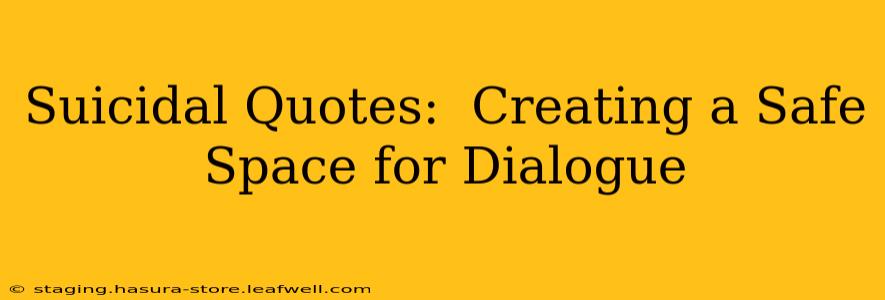Suicidal Quotes: Creating a Safe Space for Dialogue
Suicidal thoughts are a serious issue affecting millions worldwide. While exploring quotes related to suicide can offer insight into the complex emotions involved, it's crucial to approach this topic with sensitivity and a commitment to safety. This article aims to create a safe space for dialogue around suicidal quotes, exploring their potential impact and highlighting resources for those struggling with suicidal ideation. We will delve into the nuances of interpreting these quotes, understanding their context, and promoting help-seeking behaviors. This isn't about glorifying suicide; it's about understanding and preventing it.
Why People Share or Search for Suicidal Quotes?
Many individuals may encounter or seek out suicidal quotes for various reasons. Some may identify with the expressed pain and despair, finding a sense of understanding in the shared experience. Others might be exploring the depths of human emotion, seeking to understand the complexities of mental health struggles. Still others may inadvertently stumble upon such quotes during research or online browsing. It's crucial to remember that encountering these quotes doesn't automatically indicate suicidal intent. The context and individual's emotional state are paramount.
Are Suicidal Quotes Harmful? Can They Trigger Suicidal Thoughts?
The potential harm of suicidal quotes is a complex issue. While the quotes themselves don't directly cause suicide, they can potentially trigger or worsen existing suicidal thoughts in vulnerable individuals. Exposure to graphic descriptions of suicide or expressions of hopelessness can be particularly damaging for someone already struggling. The impact depends heavily on the individual's mental state, their support system, and their access to mental health resources. It's therefore vital to approach such content with caution and awareness.
How Can We Talk About Suicidal Quotes Responsibly?
Responsible discussion necessitates a focus on empathy, understanding, and preventing harm. Here's how we can create a more responsible approach:
- Avoid Sensationalizing: Refrain from highlighting or amplifying the quotes themselves. Focus instead on the underlying issues and the need for help.
- Promote Help-Seeking: Always include clear and accessible information about mental health resources and crisis hotlines.
- Emphasize Hope and Recovery: Share stories of recovery and resilience to counteract the feelings of hopelessness often expressed in suicidal quotes.
- Contextualize: When discussing a quote, provide context, acknowledging the complexities of mental illness and the circumstances that might lead someone to express such sentiments.
- Focus on Prevention: Shift the focus from the quote itself to strategies for preventing suicide and promoting mental well-being.
What Resources Are Available for People Experiencing Suicidal Thoughts?
It's crucial to remember that you are not alone. If you or someone you know is struggling with suicidal thoughts, please reach out for help. Here are some resources:
- The National Suicide Prevention Lifeline (US): 988
- The Crisis Text Line (US): Text HOME to 741741
- The Trevor Project (LGBTQ youth): 1-866-488-7386
- The Samaritans (UK): 116 123
These are just a few examples, and many other resources are available depending on your location. Remember that seeking help is a sign of strength, not weakness.
How Can We Create Safer Online Spaces Regarding Suicidal Content?
Creating safer online environments requires a multi-pronged approach:
- Platform Responsibility: Social media platforms and search engines should implement robust content moderation policies to identify and remove harmful content.
- User Reporting Mechanisms: Clear and accessible reporting mechanisms should allow users to flag potentially harmful content.
- Mental Health Literacy: Increased public awareness and education about mental health can help individuals identify and respond appropriately to potentially harmful content.
- Community Support: Online communities focused on mental health support can provide a safe space for individuals to share their experiences and connect with others.
By understanding the complexities surrounding suicidal quotes and actively promoting responsible discussion, we can work together to create a safer and more supportive environment for individuals struggling with suicidal thoughts. Remember, reaching out for help is a brave and crucial step towards recovery and well-being.

